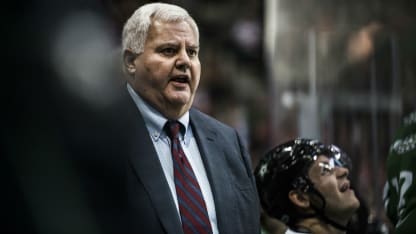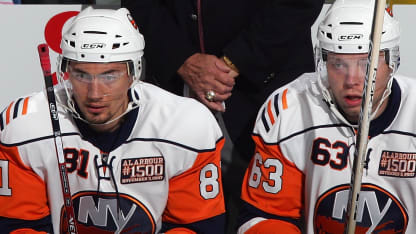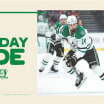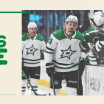Just because you are a student of history, respect history and study history doesn't necessarily mean you are comfortable making history.
And so it is that Ken Hitchcock paused as he stood at the doorway to a historic mark, passing the legendary Al Arbour into third place in all-time wins, as though the idea wasn't all that appealing.
Only Scotty Bowman, the greatest coach of any kind in any sport, and current Chicago Blackhawks coach Joel Quenneville have more wins than Hitchcock's 783 -- the last of which was earned Saturday night with a 3-1 win over Colorado.
After passing 'measuring stick' Arbour, Hitchcock humbled by history made
The Stars coach admits there is a sense of misgiving that comes with moving into third on the all-time wins list

Bowman, the standard bearer with 1,244 regular season wins and 223 more in the postseason, and Arbour are in the Hall of Fame. Quenneville and Hitchcock are destined to be there if they ever decide to give up the bench.
What was surprising, as the milestone came into view -- and became impossible to avoid -- was the sense of misgiving that Hitchcock had in passing Arbour.
"Well, I've said this before: we all coached a little bit against Scotty, or we got our lunch handed to us whatever way you want to go with Scotty, but Al was more the measuring stick for us," Hitchcock explained.
"Scotty was kind of rarefied air at that time, and Al was a guy that we got to talk to and meet," Hitchcock said. "Because (Arbour) had so many players from the west, I knew him and he knew me. I don't feel good about it. So I don't really know why. But I don't feel good. I think he's a special human being and he was a special coach. He was a guy that I could relate to."
In the end, history always tells its own story and Hitchcock, reluctant or not, plays a leading role in the history of the game at least as far as coaching goes. But Ray Ferraro, who played for Arbour and is one of the game's most respected national analysts, understands the complex emotions at play regarding such an historic moment.
"First off, I'm really protective of Al and his legacy," Ferraro said. "He was a fabulous man. He was a great coach. Best coach I ever played for. But he was a fabulous man."
"Hitch is such a historian -- a student of many things. And Al was an icon," Ferraro said.
As such, having your own career intersect with such an icon can be difficult to accept.
"Unless you're exceedingly arrogant, you would never put yourself in that spot," Ferraro said. "I see why he's uncomfortable."
Tom Kurvers is the current senior advisor to Tampa Bay Lightning general manager Steve Yzerman who grew up winning Stanley Cups under Bowman. Kurvers doesn't know Hitchcock other than by reputation, but did play for Arbour on Long Island in the early 1990s.
Like Ferraro, he is protective of Arbour and his legacy and is likewise understanding of the conflicted feelings that Hitchcock had leading into Saturday's win.
"I would applaud those words from Hitch," Kurvers said this week. "That's respectful. Maybe that's old-school."
"That's a long period of time to be in a craft that demands everything you have for nine or 10 months a year," added Kurvers. "I like that he said that. Maybe that's how hockey separates itself from the other sports. We seem to think so. Some of the media seem to think so. It's a good fraternity of men."
Rob Dimaio first played for Hitchcock as a teenager in the Western Hockey League and later in Philadelphia, when Hitchcock was an assistant, and in Dallas for the Stars during Hitchcock's first go-round as head coach.
Now the head of player personnel for the St. Louis Blues, a team Hitchcock coached until last February, Dimaio also played for Arbour on Long Island. The two men couldn't be any different, Dimaio said, with the exception they are both considered among the greatest coaching minds ever.
Hitchcock may be one of the brightest people, never mind hockey people, he's encountered, Dimaio said. He described as "uncanny" Hitchcock's ability to sort through what works and what doesn't work and his relentless approach to what he expects of his players in getting them to play a certain way.
Arbour had a different approach.
"The one thing I'll say about Al that I think most guys who played for him would say, he wasn't just a coach," Dimaio said. "He was literally a father figure to so many players. Even guys that were at the end of their careers. He got that respect from them. Players didn't want to disappoint him."
When you are talking about men who have won more than 800 regular season games in the NHL, this isn't about comparing the two. That's a mug's game like talking who's better -- Wayne Gretzky or Mario Lemieux; or Martin Brodeur or Patrick Roy.
But maybe this is the kind of moment that affords us a chance to acknowledge an important milestone for Hitchcock, while taking an opportunity to remember a legend in Arbour, whose exploits may be less known to a new generation of fan.
"It makes me appreciate what Al did and that I was able to play for a guy like that," said defenseman Ken Morrow, who won four Stanley Cups under Arbour after being part of the U.S. Miracle on Ice gold medal win at the 1980 Olympics. "He became the New York islanders."
"He had time for everybody," Morrow added. "He always preached to us as players respect, and discipline, and he lived his life that way so how could you not look up to someone like that?"

© Getty Images
Ferraro recalls late in the 1992-93 season coming back from a broken leg. Ferraro had played a handful of games and wasn't very good. Arbour called him into his office with three games left before the playoffs and referred to him as seagull. If you're not yapping, you're crapping was the message. But he wasn't playing hockey and, if he didn't start soon, he'd be in the stands with Arbour's wife, Claire.
"He was really firm and direct, and then he gave you a chance," said Ferraro, who would score 13 goals and collect 20 points for an Islander squad that would upend the defending Stanley Cup champion Pittsburgh Penguins en route to the Eastern Conference final in the spring of '93. "How could you not want to play for somebody like that?"
Ferraro had a conversation with new Vancouver head coach Travis Green recently about Arbour. Green recalled for Ferraro sitting on the bench during a game and having Arbour giving him a boot to the rear end. "Literally kicked him in the butt," Ferraro said. Then, Arbour leaned in and told Green he needed to decide if he wanted to be an NHL player because the time was now for that to happen.
Then, he double-shifted Green the rest of the game.
"That was a lightning bolt, turning point moment," Ferraro said.
Tom Fitzgerald first met Al Arbour when the New York Islanders drafted Fitzgerald in the first round of the 1986 draft. Arbour had stepped down from coaching to accept a player development role at the end of that 1985-86 season. After watching Fitzgerald and other young prospects in various minor pro rinks for several seasons, Arbour returned as the Isles' coach during the 1988-89 season and remained until his retirement after the 1994 season.
Even now, it seems like yesterday -- not 25 years ago -- that Arbour stood behind Fitzgerald on the Islander bench, Fitzgerald said. That Hitchcock was about to pass Arbour came as something out of the blue to Fitzgerald, now the assistant GM in New Jersey.
"I just think it says the world about what kind of coach he is," Fitzgerald said of Hitchcock.
"I guess I don't think of myself as old," Fitzgerald with a laugh. "But when someone's measured up to such a person -- a coach, a mentor, a friend, a Hall-of-Famer like Al Arbour -- it really does take you aback. I didn't know Hitch was that close. You don't follow coaching records, they just happen."
As for Arbour, Fitzgerald wishes he could ask him one question: What was up with the dress slacks on the ice? Even now, Fitzgerald chuckles at the occasional mornings Arbour would show up for a morning skate, or off-day practice, with dress slacks, a button down shirt, a track jacket and mittens -- never traditional hockey gloves and mittens.
"Talk about old-school," Fitzgerald said.
Old-school, indeed. And so, we meet at the intersection of history and the future.
Someday, someone will write a story about a coach passing Hitchcock, and they'll find people lining up to speak reverently about Hitchcock -- just as they lined up to speak so of Arbour.
And so, they should.
This story was not subject to approval of the National Hockey League or Dallas Stars Hockey Club. You can follow Scott Burnside on Twitter @OvertimeScottB and listen to his Burnside Chats podcast here.


















